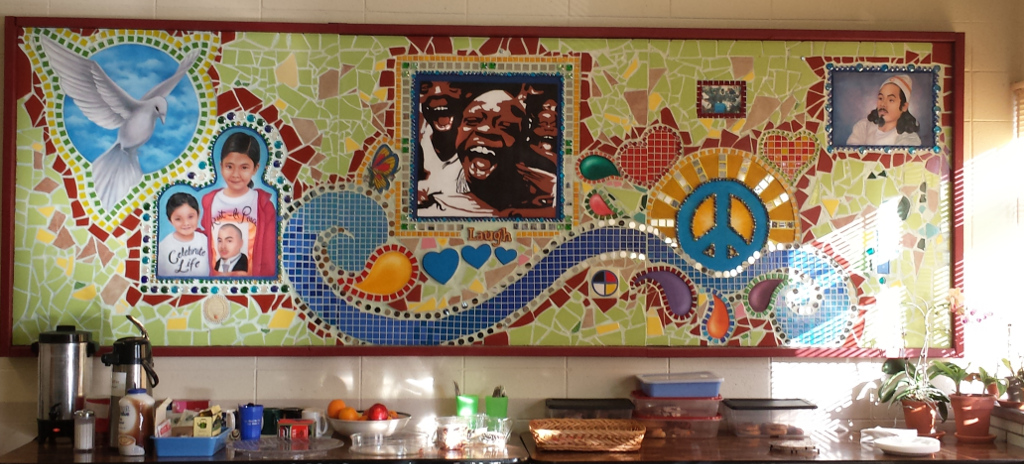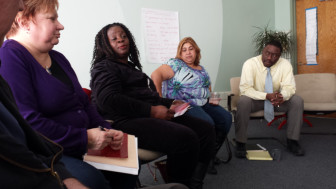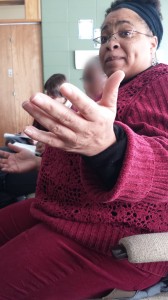 CHICAGO — Tuesday afternoons around lunchtime, Precious Blood Ministry in Chicago’s Back of the Yards neighborhood opens for a group of mothers chatting up to the door, balancing home-made lasagna and chocolate chip cookies. They come from the West and South Sides of Chicago, and they’re good friends despite their circumstances for coming together, which isn’t just to discuss the polar vortex over sloppy joes.
CHICAGO — Tuesday afternoons around lunchtime, Precious Blood Ministry in Chicago’s Back of the Yards neighborhood opens for a group of mothers chatting up to the door, balancing home-made lasagna and chocolate chip cookies. They come from the West and South Sides of Chicago, and they’re good friends despite their circumstances for coming together, which isn’t just to discuss the polar vortex over sloppy joes.
The group’s leader is a redheaded real estate agent named Julie Anderson, whose brawling voice precedes a plain-spoken personality highlighted by intermittent, self-deprecating quips at the expense of her own Catholic idiosyncrasies. Others include mother-daughter pairs and grandmothers who make the trek down to Precious Blood every week alone. One woman carries a petition along with a photo of her son everywhere she goes. Another reads aloud to the group a letter she wrote to a prison inmate whom she has never met.
Regardless of this year’s unusually frigid winter, about 10 women show up regularly.
After lunch, they sit in a circle in the ministry’s main meeting room along with representatives from Northwestern University’s Children and Family Justice Center. Spread out on a carpet at the center of the circle are various tokens echoing sentiments that the women are encouraged to reach for during their support session: a yellow box is labeled “Respect,” a smooth stone marked “Peace” – the Crucifix and and eagle feather speak for themselves.

The Chicago Bureau
Julie Anderson, left, leads her support group for families with relatives sentenced to juvenile life without parole as lawyer Emmanuel Andre, right, looks on.
The meeting begins when Anderson introduces a special guest, psychologist Darlene Perry, who focuses on treating trauma victims and prison exonerees struggling to reintegrate into society. Perry is there to support the women at a unique time in their lives, to help them “sit with themselves” as she puts it, through what could be the second most important event in their lives.
All the women present have family members in prison. More than that, most of their sons, brothers and grandsons were sentenced as minors in their mid-teens to life imprisonment without the possibility of parole. That means decades ago when they sent their children off to prison, it was with the expectation that they would die there.
Now that there have been signs that shifting criminal justice policies may grant their loved ones a second chance, the women of Communities and Relatives of Illinois Incarcerated Children (CRIIC) dare to hope that their boys will get to see life outside of prison again.
But as Anderson puts it to Perry with a nervous laugh, “I gotta tell you, sorry, I’m hyperventilating just thinking about this. I don’t even think any of us would know what to ask you, how to move forward. We just have our little glimmer of hope right now.”
CONSTITUTIONALITY AND CONSCIENCE
On the issue of juvenile life without parole, the Illinois state legislature is currently out of compliance with nation’s highest court. The current mess of debates over child sentencing stemmed from a 2012 United States Supreme Court ruling that left some room for state-by-state interpretation.
The U.S. Supreme Court ruled in June of 2012 that mandatory life without parole sentences for juveniles, even in the case of homicide, is unconstitutional under the 8th Amendment, which bans cruel and unusual punishment. However, its findings in Miller v. Alabama did not account for whether that opinion applies to cases that have already been settled, to the 300 or so adult inmates currently serving life sentences they were given as minors.
In Illinois, the debate has come down to the case of Adolfo Davis, Anderson’s one glimmer of hope.
WHAT ADOLFO DAVIS MEANS FOR JUVENILE LIFE WITHOUT PAROLE
Adolfo Davis is a Chicago man whose non-lethal participation in a bloody robbery when he was 14 had earned him mandatory life sentencing without the possibility of parole. The Illinois Supreme Court heard the oral arguments in his trial earlier this year. If the court, which could make a decision in the case this week, rules in favor of Davis and his argument that he had been not only unfairly – but also unconstitutionally – over-sentenced in 1990, that decision could set a precedent for hundreds of homicide cases statewide.
Davis’ success would make it more likely that current detainees of the Illinois Department of Corrections who were locked up as juveniles would have their cases heard and their sentences commuted.
Pending that decision by Illinois’ highest court, there are families around the state who can hardly stand to breathe. The Davis case represents a tremendous spark of hope for those incarcerated, who through the decades were told to relinquish the chance of life on the outside. For the families of homicide victims, especially those who lost their own children to child murderers, the idea of re-sentencing is an impossible horror.
 On the one hand, juvenile justice reform advocates the country over have argued time and again that children are categorically less culpable for crimes because they are cognitively underdeveloped, that they lack the same decision-making skills that adults have – something the U.S. Supreme Court took noted and underlined in its 2012 decision. These advocates say that a great many men who grew up in prison were over-sentenced for stupid mistakes they made as kids under minimum sentencing laws that no longer apply. They say that those inmates now understand their crimes and have, in many if not all cases, repented for them.
On the one hand, juvenile justice reform advocates the country over have argued time and again that children are categorically less culpable for crimes because they are cognitively underdeveloped, that they lack the same decision-making skills that adults have – something the U.S. Supreme Court took noted and underlined in its 2012 decision. These advocates say that a great many men who grew up in prison were over-sentenced for stupid mistakes they made as kids under minimum sentencing laws that no longer apply. They say that those inmates now understand their crimes and have, in many if not all cases, repented for them.
For Anderson, whose son Eric was 15 when he was instructed by older members of his gang to shoot blindly into a van, killing two teenage girls, the re-sentencing debate represents an all-or-nothing opportunity of a lifetime. The death of the two girls was horrible, she does not dispute – but to her, punishing her son without end without giving him the chance to repay his debt to society is not the answer.
Though the possibility of Davis’ success leading to redemption for Eric is a happy one, Anderson confessed to her support group that her greatest fear is sitting in a courtroom a second time and listening to a judge re-sentence her son to life imprisonment.
“My son was 15 when he was arrested, 17 when he was actually sentenced,” Anderson said. “I don’t think he actually understood what they were saying, like really got it. He’s 34 years old now. He gets it. So as bad as (the original sentencing) was for him, this would be 300 times worse.”
Though there’s no doubt Anderson and the other women of Communities and Relatives of Illinois Incarcerated Children lost their boys to crime, each case also represents a family that had to live through the literal death of a loved one.
The call for re-sentencing of convicted murderers proposes dragging families of victims through renewed court processes involving details many had long tried to bury. The inevitable re-traumatization of families due to those proposed hearings has outraged victims’ advocates throughout the state.
Jennifer Bishop-Jenkins, a leading activist for victims’ rights, founded the National Organization of Victims of Juvenile Murderers following the gruesome premeditated triple murder of her brother-in-law and pregnant sister by a teenage shooter.
Though for decades Bishop-Jenkins has been heavily involved in criminal justice reforms, including abolishing the death penalty in Illinois, she does believe in sentencing certain juveniles to life without parole. It is naïve, she suggests, to categorically consider some killers less culpable due to their youth when they plan murders far in advance of committing them, gloat afterward and then refuse to repent in the years following.
“When something happens to reawaken the trauma, when (victims’ families) see somebody who reminds them of their murdered loved one, the trauma comes out and it feels like it’s happening now,” Bishop-Jenkins described the lasting pain of remembering a homicide. “The heart races, the stomach churns. When victims’ families get re-traumatized in these situations, it’s actually an immediate threat to their health. And to propose multiple hearings just compounds that.”
THE PSYCHOLOGY OF TRAUMA
As psychologist Darlene Perry listens to CRIIC members talk about their hope and fears for re-sentencing, she notices a certain “elephant in the room.” She tells the women that her goal is to help them prepare for the day they may be able to reconnect with their children, but in order to get to that point they need to be in right standing with themselves.

The Chicago Bureau
“One of the things I’m hearing is we’re comfortable talking about the injustices and the advocacy,” Perry said. “We’re comfortable with the hope that we need. But I’m not hearing the willingness to sit with how your life has been altered, how your soul has been altered. I’m telling you now that you have to heal that before you can help anyone else.”
Anderson dispels the tension that followed Perry’s observations with a joke about Irish Catholicism and denial, but it’s fellow member Kathy Aguilar who tries to explain another reason why families of the incarcerated can’t find peace until the day they actually get their loved ones back. Greater than her own fear losing her brother a second time if his case is reheard is the fear of what that decision would do to him.
“Now that the hope is there, (my brother) goes, ‘My heart’s just bursting and pounding that I could walk out of here.’ My fear is really for him,” Aguilar said. “He’s changed his life around and he’s not that 16-year-old boy anymore, but will anyone else on the outside see it?”
Aguilar said she doesn’t know if her brother will last through the re-traumatization of a second life sentence. He’s been incarcerated 33 years when many other inmates imprisoned for less have committed suicide.
For the parents of homicide victims, fear for their surviving children similarly outweighs fear for themselves.
Dora Larson, 67, is a longtime victim rights activist who helped found the Illinois Department of Corrections’ first victim services unit. Her daughter Vicki was only 10 when she was kidnapped, raped and strangled by a 15-year-old who dug her grave three days prior to committing the crime back in the summer of 1976.
The convicted killer was sentenced to life imprisonment, but the possibility of his release has motivated Larson in recent years to renew her fight to bring victims’ families to the negotiation table over juvenile life without parole.
“(Miller v. Alabama) was a nightmare,” Larson recalled hearing about the U.S. Supreme Court’s decision to ban juvenile life sentencing. (The court had earlier taken the death penalty off the table, and life without parole for crimes except in cases of homicide, which Miller changed). “I have children and grandchildren and I worry about them if this guy gets out. He’s fairly young. It’s going to be up to my boys to step up and go to all these hearings.”
Larson’s adult son John wasn’t even born when Vicki was murdered. Now a police officer in Springfield, Ill., John assures his mother that he’ll always continue their family’s fight to keep his sister’s killer behind bars.
“That’s what scares me to death,” Larson said. “I don’t want him out so he could do it again. It’s not fair that the second generation is going to have to take care of it.” She recalled that before Vicki’s killer targeted their family, he had spent some time in a juvenile facility for planning a different girl’s murder and for keeping a gun in his middle school locker. The Department of Corrections released him for the summer, promising to give him his freedom for good if he could behave himself. Larson suspects that if he were given that third chance, he would kill again.
NO SIDES, JUST A CRIME AND ITS VICTIMS
Larson said she has forgiven, not forgotten, her daughter’s killer for her own sake even though she said he has never apologized to her family. She said she has no animosity toward his family because she, more than the ordinary mother, can empathize with losing a child.
Bishop-Jenkins agreed that mistakes can occur in the criminal justice system, which like any other complex human institution is vulnerable to miscarriage of justice. Adolfo Davis, for example, deserves a certain degree of clemency, she said.
“I think we could all agree that he may have been over-sentenced for his intent,” Bishop-Jenkins said. “Yes he was a 15-year-old co-conspirator and he was involved in talking about killing, but should he have been living life without parole? Probably not,” she said. “There is a reasonable way out, absolutely.”
But what frustrates Bishop-Jenkins most as a victim rights activist is the lack of formal invitation of victims’ families to negotiations between advocates for juvenile sentencing reforms and the state. She requests that lawyers working on cases that pertain to victims’ families notify them of the potential impact of legislation changes because for her personally, the right to information is the only thing that helps to process the trauma of reliving her sister’s murder.
Northwestern’s Children and Family Justice Center is one major advocate of juvenile life without parole reform and so is Human Rights Watch. Representatives occasionally update Bishop-Jenkins on status updates, but she believes there is not enough cooperation among all pertinent stakeholders on the issue of juvenile life without parole.
Human Rights Watch’s Chicago director, Jobi Cates, said she doesn’t want to diminish the pain that victims’ families go through, but she is charged to work within her mandate for her immediate clients.
“We can never make up for the pain that victim family members experience — it is one of the most difficult aspects of working on this issue,” Cates wrote to The Chicago Bureau. “But we have to balance that with the importance of our mandate, which is to ensure that children in the care of the state have a chance to rehabilitate in accordance with brain science, the international convention on the rights of the child, and the 8th Amendment.”
Julie Anderson and other relatives of those incarcerated have never met directly with Jennifer Bishop-Jenkins and her organization for the families of victims, but they have come head to head in Springfield to lobby on opposite sides of the case for juvenile life without parole reform. In those instances, they see each other across the aisle, watch each other seek out reporters and insert themselves in front of cameras. There is the understanding that their efforts, though contradictory, are mutually motivated by the love of their children.
This story produced by the Chicago Bureau
I have been an advocate all of my adult life, I try to be a voice for ALL the children, due to lack of funds, of course, I cannot help them all. I do help and sponsor a child in SC, of whom was only 15, was just with the wrong ADULTS, but got sentenced right along with the bad people who killed two store workers and rob them, this child got 30 yrs with NO chance of parole, she has been in going on 12 yrs of that 30. She has applied for clemency as of Feb 5th, but is losing hope to ever get out before the 30 yrs. I have fought for her, wrote thousands of letters, yet no one will listen and no courtesy of even a reply. Children DO deserve a chance to “prove” themselves, they do change as they get older. Compassion, redemption, mercy IS part of “final justice”, IMO